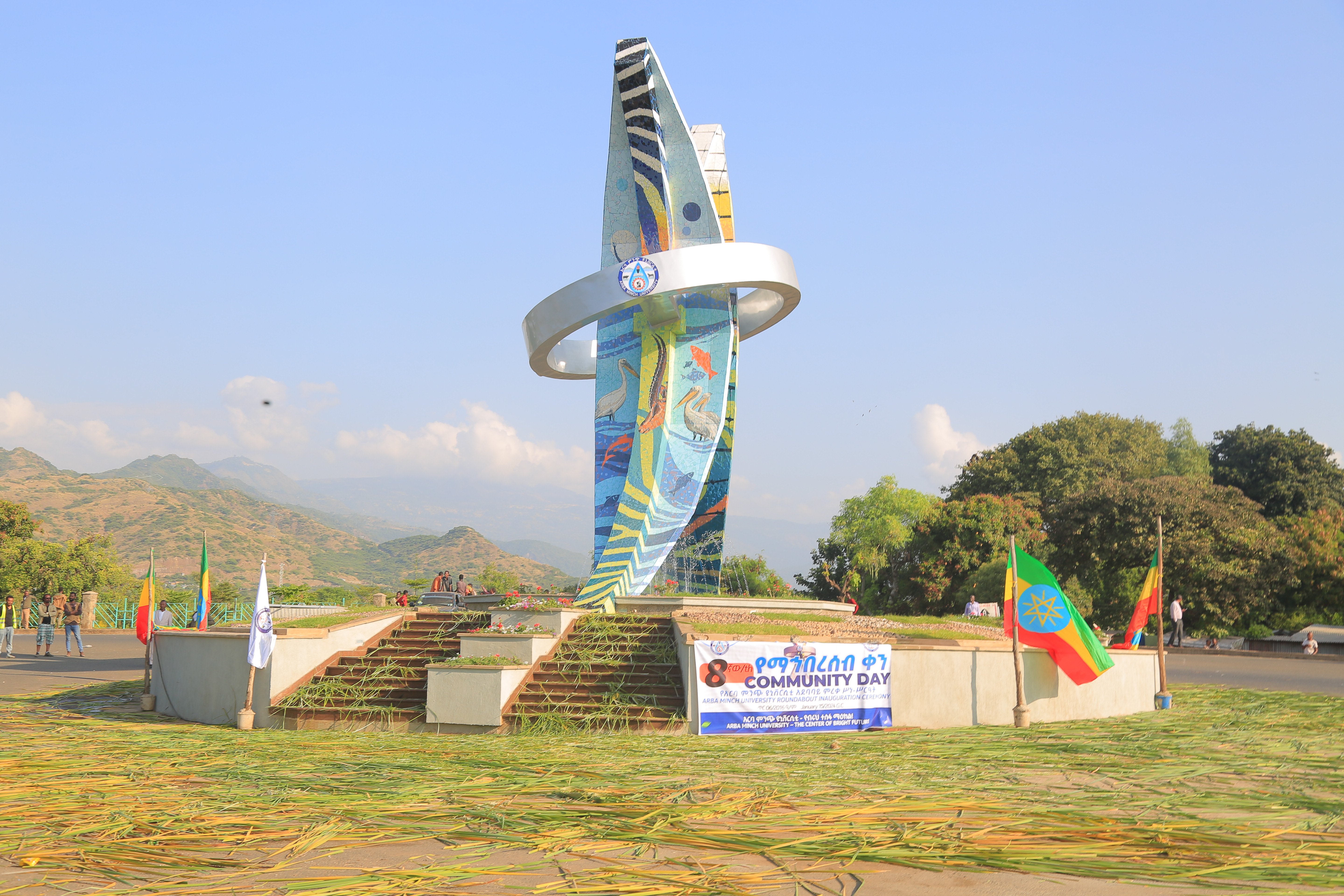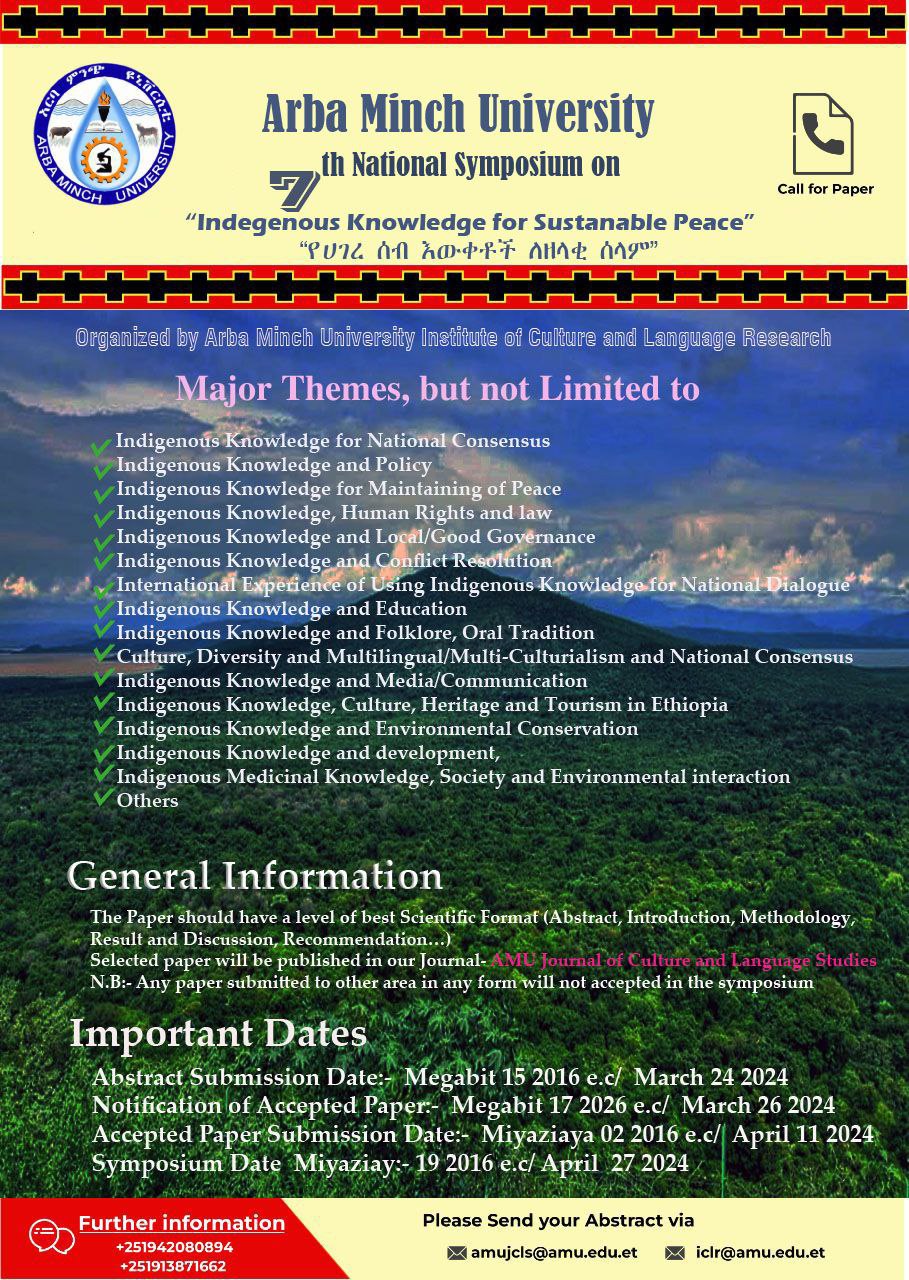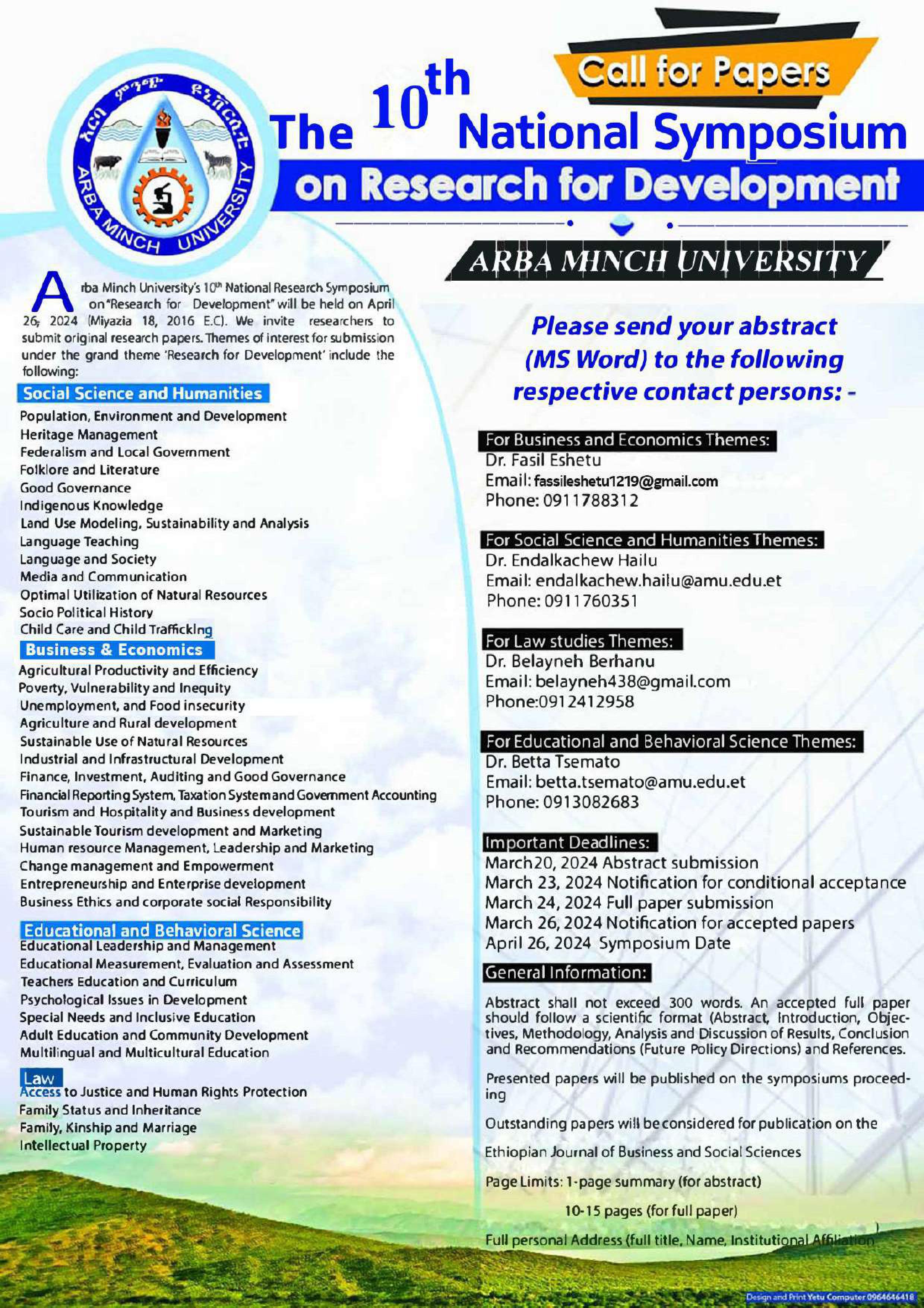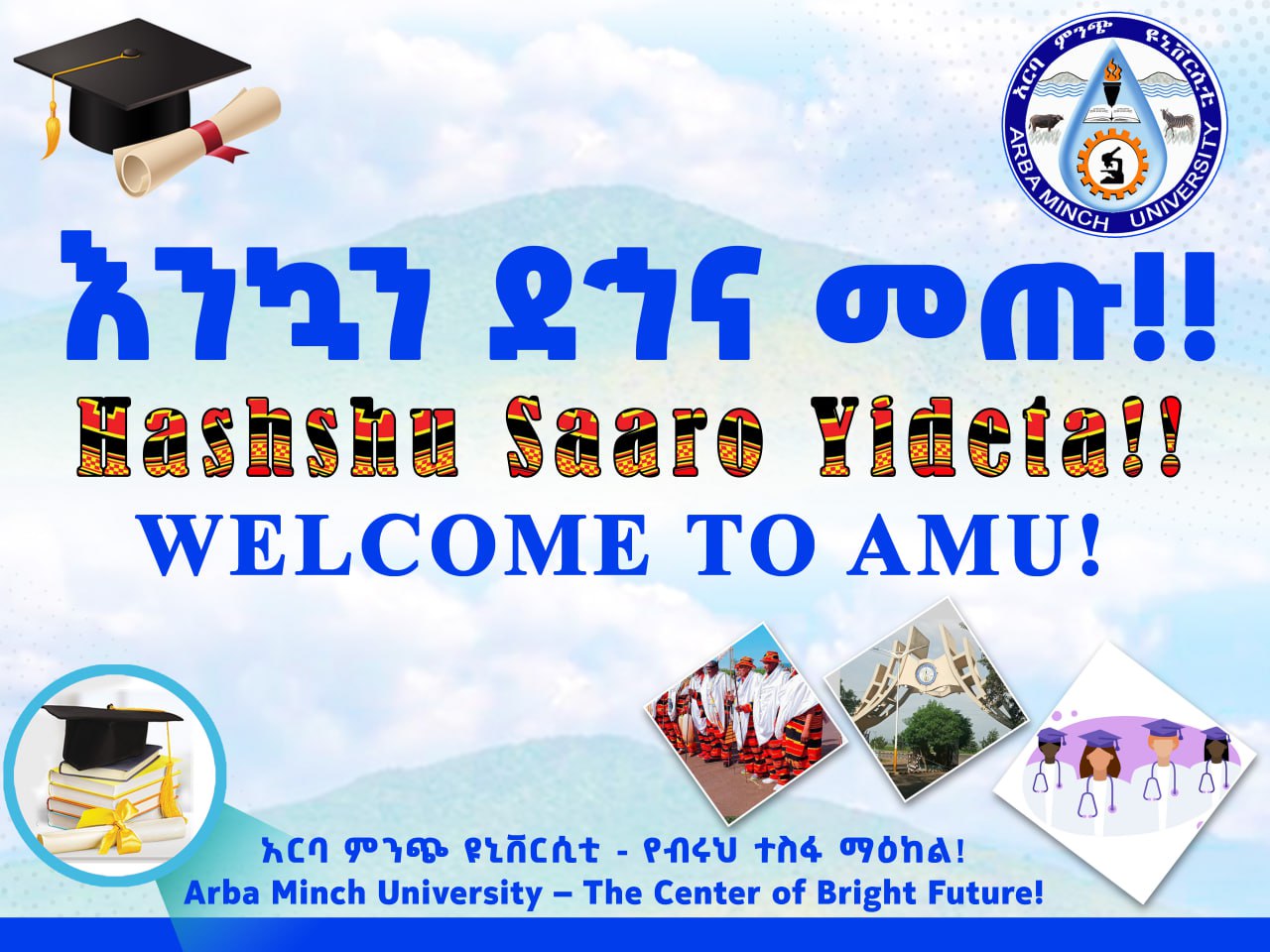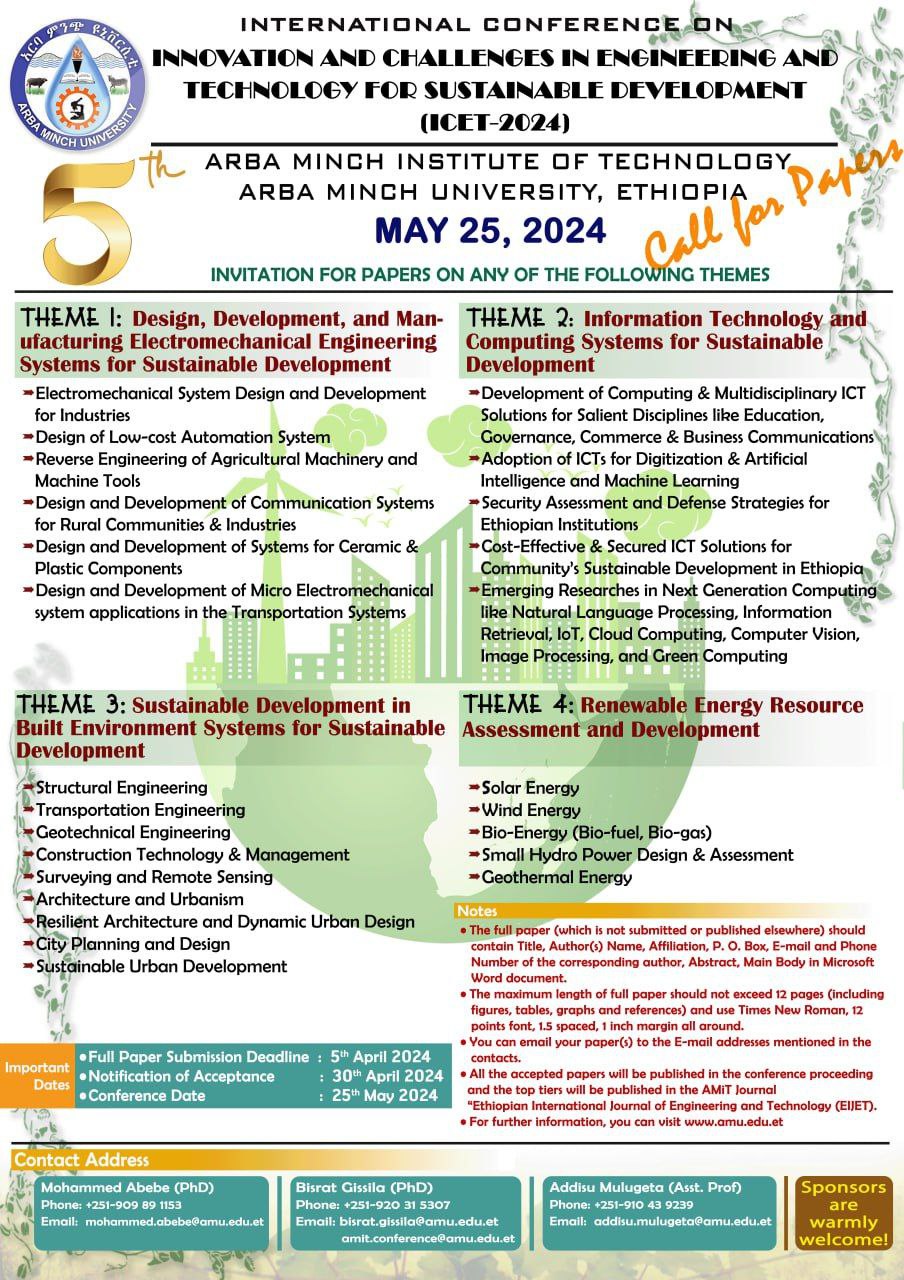Arba Minch Institute of Technology (AMiT) has conducted the 4th International Conference on “Innovation and Challenges in Engineering and Technology for Sustainable Development (ICET-2023)”, from May 26-27, 2023. AMiT also has officially launched Ethiopian International Journal of Engineering and Technology (EIJET).Click here to see the Pictures!
Opening the Conference, Academic Affairs Vice president and Delegate for University’s President, Dr Alemayehu Chufamo said that research and innovation works are not optional, but rather a necessity and urgent agenda that we have to emphasize to cope with emerging needs of the society. Though we have a well-recognized experience in conducting various researches in the University, the dissemination of the research findings to end users seems not sufficient; therefore, as an academic institution, we are working on it with priority to finance innovation and research projects that address immediate problems of the society, he added.
AMiT Scientific Director, Dr Muluneh Lemma in his welcoming remark noted that AMiT currently encompasses five faculties and runs eight undergraduate and 16 postgraduate academic programs. Already having two PhD programs in Computer Science and IT and Mechanical Engineering, the institute is getting ready to launch more PhD programs in Civil and Electrical and Computer Engineering in 2023-24. According to Dr Muluneh, AMiT as part of AMU is committed to strongly support academic, research and notable community engagement works and disseminate to the community.
The first keynote speaker Dr. Denekew Abera, Principal Software Engineer and Data Scientist at Microsoft from United States of America, speaking on “Information Communication Technology (ICT) and Computing Systems for Sustainable Development”, said that ICT solutions play a vital role to revolutionize education, governance, and commerce. He also noted that converting analog to digital for efficient storage and accessibility, optimizing healthcare, agriculture, and energy sectors digitization, Artificial Intelligence (AI), and machine learning are crucial to Ethiopia’s sustainable development. Therefore, to promote ICT and Computing systems in Ethiopia, research and academic institutions are expected to conduct context-specific research for impactful ICT solutions, promote knowledge sharing and capacity building in ICT, collaborate with local and global partners for expertise and resources, encourage researchers from diverse fields to collaborate, and design tailored ICT solutions for emerging challenges, he recommended.
Dr Daniel Lirebo, Dean of the College of Urban Development and Engineering of Civil Service University, in his keynote speech said that science, technology, and innovation are interdependent concepts that play a critical role in achieving sustainable development. Speaking on the issue of smart city, he said, it is about the use of digital solutions for significant benefit of the inhabitants of the city and its business. He also added that synergy, sympathy and synthesis are basic in building smart cities.
Dr. Mahmud Abubakar, from the Federal University of Technology, Minna, Nigeria, Presenting his finding on “Numerical Investigation of Reinforced Concrete Beam Containing Iron Ore Tailings as Partial Replacement of Sand”, Said, Iron ore tailing /IOT/ is a waste product generated from the production of iron ore and disposed to landfill without any economic value and has a significant environmental impact. He noted that the three-dimensional non-linear finite simulations using the ABAQUS/CAE software to predict the behavior of a reinforced concrete beam that incorporated 20% IOT revealed that IOT is suitable source for partial replacement of sand in producing concrete beam, he reported.
Amin Tuni, the other presenter from AMU, presenting his research findings on "Exploring and Designing Indigenous Knowledge Management Framework for Konso People's Soil Conservation Mechanism”, said that indigenous knowledge management /IKM/ framework and the developed prototype enabled knowledge management easy. He explained that newly introduced IKM framework for soil conservation is designed and developed using the SWI Prolog tool which is validated and evaluated by ISO-1826 I standards. He further adds that the proposed IKM framework for soil conservation in konso people has a significant role to share, transfer and preserve the indigenous knowledge to the coming generation.
AMiT also has officially launched the 5th research journal of AMU, Ethiopian International Journal of Engineering and Technology (EIJET). During the ceremony, it was remarked that Intelligent Computing and Information Technology, Mechanical and Metallurgy Engineering, Architectural Design and Town Planning, Civil and Transport Engineering Systems, Electrical Engineering and Power Electronics, Emerging areas of Renewable Energy and Papers related to allied disciplines, emerging technologies, and future-generation engineering will be given priority for publication.
Researchers from Ethiopian and abroad Universities participated; AMU top and mid-level officials, research and academic staff were in attendance and Ovid Kling Consulting PLC and QTC Engineering Consultancy PLC co-sponsored with Platinum and Silver level respectively.
Arba Minch University
The Center of Bright Future!
For more Information Follow us on:-
Website - https://www.amu.edu.et/
Telegram - https://t.me/arbaminch_university
Facebook - https://www.facebook.com/ArbaMinchUniversityCCD/
YouTube - https://www.youtube.com/channel/UCOO_nclhMo8M3r74OyPBlVA
Communication Affairs Directorate
